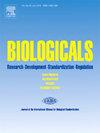埃塞俄比亚基于DF-1细胞培养的传染性法氏囊病病毒疫苗开发评价
IF 1.5
4区 生物学
Q4 BIOCHEMICAL RESEARCH METHODS
引用次数: 0
摘要
传染性法氏囊病是由传染性法氏囊病病毒(IBDV)引起的雏鸡高度传染性、免疫抑制的病毒性疾病。该研究是在埃塞俄比亚国家兽医研究所(NVI)开展的,目的是评估IBDV的DF-1细胞培养适应疫苗株作为候选疫苗的能力。用LC-75疫苗株1 ml吸附法感染第27代融合单层的DF-1细胞,记为传代1 (P1)。这一过程已经重复了七次,用相同的方法将病毒感染到DF-1细胞上。第二代观察到轻微的CPE,但从第三代(P3)开始观察到生动的细胞病变效应(CPE)。测定了DF-1细胞适应病毒的感染滴度,结果显示滴度随传代次数的增加呈线性增加。针对VP2基因的转录聚合酶链反应(RT-PCR)显示400碱基对阳性扩增。接种了第5代、第7代和CFC基疫苗的实验雏鸡均未出现临床症状和/或死亡。功效试验表明,DF-1适应疫苗株对第5代和第7代的攻毒株具有保护作用。另一方面,对照组的发病率为100%,死亡率为91%。因此,DF-1细胞可作为研究IBDV动力学生长的模型,DF-1细胞适应病毒可作为IBD疫苗开发的候选病毒。因此,推荐使用DF-1细胞生产IBD疫苗。本文章由计算机程序翻译,如有差异,请以英文原文为准。
Evaluation of DF-1 cell culture based vaccine development for infectious bursal disease virus in Ethiopia
Infectious Bursal Disease is a highly contagious, immunosuppressive viral disease of young chicks caused by the Infectious Bursal Disease Virus (IBDV). The study was carried out at the National Veterinary Institute (NVI) of Ethiopia to evaluate the competence of the DF-1 cell culture adapted vaccine strain of IBDV as a vaccine candidate. DF-1 cells at passage 27 confluent monolayer was infected with 1 ml of LC-75 vaccine strain virus by adsorption method and recorded as passage 1 (P1). This procedure has been repeated up to seven serial passages with the same methods of virus infection onto DF-1 cells. Minor CPEs were observed in the second passage, but vivid cytopathic effects (CPE) were observed starting from passage 3 (P3). The infectivity titer of DF-1 cell adapted virus was determined, and the results showed a linear increase in titer with each passage number. Transcriptase polymerase chain reaction (RT-PCR) targeting the VP2 gene revealed positive 400-base pair amplification. The vaccinated experimental chicks from passages 5 and 7 and the CFC based vaccine showed no clinical signs and/or death. Efficacy test revealed that DF-1 adapted vaccinal strain protected the chicks from the challenged virus strain at passage 5 and 7. The control group, on the other hand, had 100 % morbidity and 91 % mortality. As a result, the DF-1 cell could be used as a model to study IBDV kinetic growth, and the DF-1 cell adapted virus could be a candidate for IBD vaccine development. Thus, IBD vaccine production using DF-1 cells is recommended.
求助全文
通过发布文献求助,成功后即可免费获取论文全文。
去求助
来源期刊

Biologicals
生物-生化研究方法
CiteScore
3.70
自引率
0.00%
发文量
39
审稿时长
48 days
期刊介绍:
Biologicals provides a modern and multidisciplinary international forum for news, debate, and original research on all aspects of biologicals used in human and veterinary medicine. The journal publishes original papers, reviews, and letters relevant to the development, production, quality control, and standardization of biological derived from both novel and established biotechnologies. Special issues are produced to reflect topics of particular international interest and concern.Three types of papers are welcome: original research reports, short papers, and review articles. The journal will also publish comments and letters to the editor, book reviews, meeting reports and information on regulatory issues.
 求助内容:
求助内容: 应助结果提醒方式:
应助结果提醒方式:


